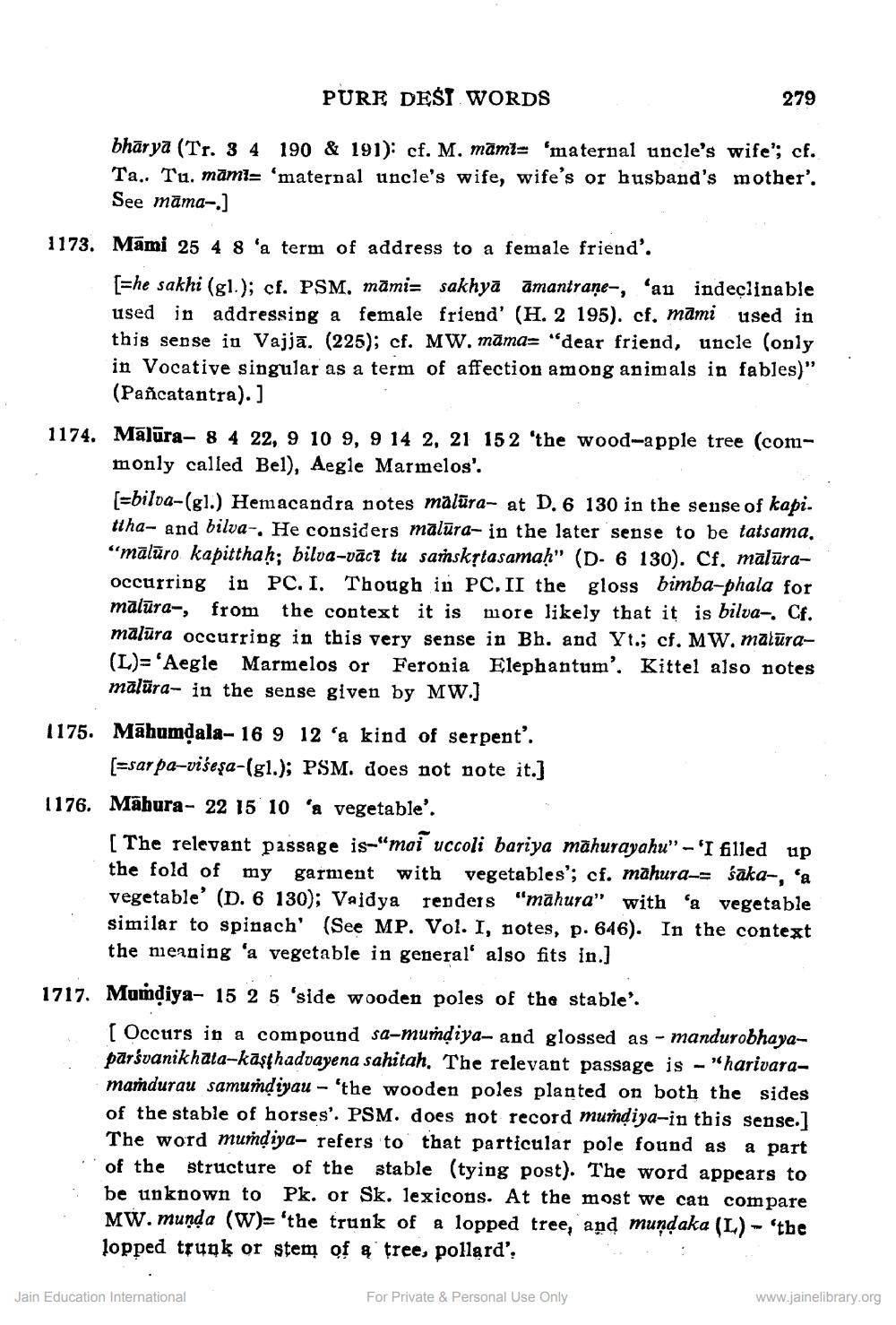________________
PURE DEŠT WORDS
279
bhārya (Tr. 34 190 & 191): cf. M. mami= 'maternal uncle's wife'; cf. Ta.. Tu, māmi= 'maternal uncle's wife, wife's or husband's mother'. See māma-]
1173. Māmi 25 4 8 'a term of address to a female friend'.
T=he sakhi (gl.); cf. PSM. māmi= sakhya amantraņe-, 'an indeclinable used in addressing a female friend' (H. 2 195). cf. māmi used in this sense in Vajjā. (225); cf. MW. mama= "dear friend, uncle (only in Vocative singular as a term of affection among animals in fables)" (Pañcatantra). ]
1174. Mālūra, 8 4 22, 9 10 9, 9 14 2, 21 152 'the wood-apple tree (com
monly called Bel), Aegle Marmelos'. (=bilva-(gl.) Hemacandra notes malūra- at D. 6 130 in the sense of kapi. ttha- and bilva-, He considers malūra, in the later sense to be tatsama. “mālāro kapitthah; bilva-vācł tu saṁskṛtasamah" (D- 6 130). Cf. malūraoccurring in PC. I. Though in PC. II the gloss bimba-phala for malūra-, from the context it is more likely that it is bilva-. Cf. malūra occurring in this very sense in Bh. and Yt.; cf. MW. malūra(L)= 'Aegle Marmelos or Feronia Elephantum'. Kittel also notes malūra- in the sense given by MW.]
1175. Māhumdala- 16 9 12 'a kind of serpent'.
[=sar pa-višeşa-(gl.); PSM. does not note it.] 1176. Māhura- 22 15 10 'a vegetable'.
[ The relevant passage is-"mai uccoli bariya mähurayahu" - 'I filled up the fold of my garment with vegetables'; cf. mahura-- śāka-, 'a vegetable' (D. 6 130); Vaidya renders "māhura" with 'a vegetable similar to spinach' (See MP. Vol. I, notes, p. 646). In the context the meaning 'a vegetable in general' also fits in.]
1717. Mumdiya- 15 2 5 'side wooden poles of the stable'.
(Occurs in a compound sa-mundiya, and glossed as - mandurobhayaparśvanikhata-kaşthadvayena sahitah. The relevant passage is - "harivaramaħdurau samurdiyau - 'the wooden poles planted on both the sides of the stable of horses'. PSM. does not record muindiya-in this sense.] The word mundiya- refers to that particular pole found as a part of the structure of the stable (tying post). The word appears to be unknown to Pk. or Sk. lexicons. At the most we can compare MW. munda (W)= 'the trunk of a lopped tree, and mundaka (L) - 'tbe lopped trunk or stem of a tree, pollard',
Jain Education International
For Private & Personal Use Only
www.jainelibrary.org




